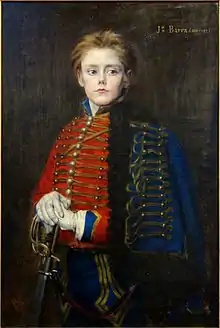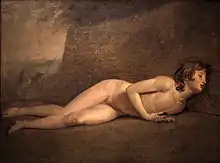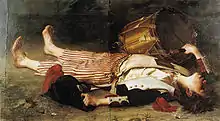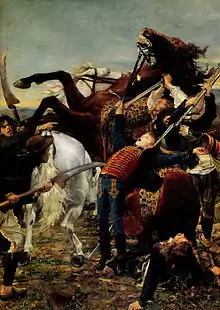Joseph Bara
François Joseph Bara, also written Barra (30 July 1779 in Palaiseau – 7 December 1793 in Jallais), was a young French republican drummer boy at the time of the Revolution.

Life, death, and legacy


Bara was in fact too young to join the army, but attached himself to a unit fighting counter revolutionaries in Vendée. After his death General J.-B. Desmarres gave this account, by letter, to the Convention. "Yesterday this courageous youth, surrounded by brigands, chose to perish rather than give them the two horses he was leading." [1]
The boy's death was seized on as a opportunity by revolutionaries, who praised him at the Convention's tribune saying that "only the French have thirteen-year-old heroes". But rather than simply being killed by Breton royalists who solely wanted to steal horses, Bara was transformed into a figure who denied the Ancien Régime at the cost of death. His story became that having been trapped by the enemy and being ordered to cry "Vive le Roi" ("Long live the King") to save his own life, he preferred instead to die crying "Vive la République" ("Long live the Republic").
His remains were to be transferred to the Panthéon during a revolutionary festival in his honor but the event was cancelled when Robespierre was overthrown the day before it was to take place.[1]
Honours

- A 1794 painting by Jacques-Louis David depicts the dying Bara.
- A statue of Bara (called Barra) lying dead by David d'Angers in 1838.
- An 1880 painting (La Mort de Bara) by Jean-Joseph Weerts also depicts Bara's death.
- A painting (La Mort de Bara) by Charles Moreau-Vauthier depicts Bara as a dead drummer boy.[2]
- A street in the 6th arrondissement of Paris is named after him.
- Bara is alluded to in the Chant du départ
- A ship of the line was named Barra in his honour
- There is a statue in his honour at Palaiseau in the Southern suburbs of Paris.
- Opera "Joseph Barra" by André Ernest Modeste Grétry
References
- Roberts, Warren. Jacques-Louis David: Revolutionary Artist. pp. 85
- "Les Moreau-Vauthier : une famille d'artistes". apophtegme.com. Archived from the original on 2 March 2015. Retrieved 7 February 2015.